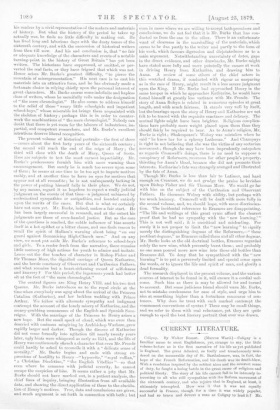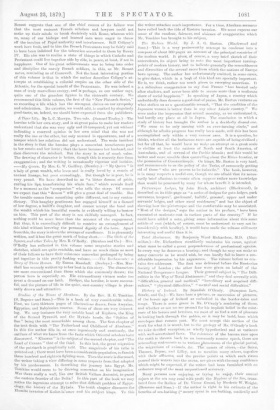CURRENT LITERATURE.
Coligny. By Walter Besant. (Marcus Ward.)—Coligny is a familiar name to most Englishmen, yet, strange to say, the little volume before us is the first narrative of his life as yet published in England. The great Admiral, so foully and treacherously mur- dered on the memorable day of St. Bartholomew, was, in fact, the hope of the French Reformation, and his death was its death-blow. With a resolution inspired by the noblest aims and the severest sense of duty, ho fought a losing battle in the great cause of religious and political liberty. The story of his life cannot fail to be intensely in- teresting to all who still sympathise with the Reform movement of the sixteenth century, and who rejoice that in England, at least, it ultimately triumphed. How was it that it was not equally successful in France, though for a time it was widely popular, and had so brave and devout a man as Coligny to lead it ? Mr. Bosant suggests that one of the chief causes of its failure was that the most eminent French scholars and lawyers could not make up their minds to break decisively with Rome, whereas with us, many of our bishops and learned men were eager to throw off the incubus of Papal authority and interference. Still Coligny's work bore fruit, and to him the French Protestants may be fairly said to have been indebted for the toleration accorded to them by Henry IV. His aim was to realise a state of things in which Catholic and Protestant could live together side by side, in peace, at least, if not in happiness. Ono of his groat achievements was to bring into order and discipline the unruly French soldiers, in this, as Mr. Besant notes, reminding us of Cromwell. Not the least interesting portion of this volume is that in which the author describes Coligny's at- tempts at establishing a colonial empire on the other side of the Atlantic, for the special benefit of the Protestants. He was indeed a man of truly marvellous energy, and is perhaps, as our author says, quite one of the grandest figures in the sixteenth century. We recommend this little volume, the first of the "Now Plutarch Series," as recording a life which has the strongest claims on our sympathy and admiration. Its exterior, we would add, is marked by singularly good-taste, as, indeed, we should have expected from the publishers.































 Previous page
Previous page